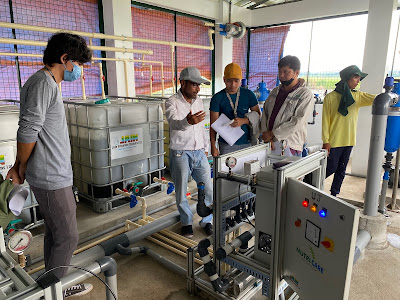Varanasi, 11 November 2022: The International Rice Research Institute South Asia Regional Centre (ISARC) and the Odisha Government organized a program for the Department of Agriculture and Farmers Empowerment (DA&FE) officials towards developing and promoting climate resilience in the state’s agriculture sector.
Pages
Monday, November 21, 2022
Wednesday, November 16, 2022
Learning session with Bangladesh stakeholders highlights short-duration and cold-tolerant high-yielding rice varieties for Haor areas
During the dry winter boro season, the Haor regions in the districts of Kishoreganj, Netrakona, Habiganj, Sylhet, and Sunamganj, Bangladesh, suffer from sudden flash floods almost every four years and the annual extreme winter cold. As a result, boro rice, which is more than half of Bangladesh’s rice production, suffered significant damage. Rice researchers and scientists propose developing short-duration, cold-tolerant, high-yielding rice varieties (HYV) to address the demands for boro rice cultivation in the Haor region.
Thursday, November 10, 2022
Scientists convened to speed up new high quality rice varieties for Haor regions of Bangladesh
To speed up the release of high-quality rice varieties in Bangladesh, seventy scientists from different research institutions and partners convened to discuss research findings and consolidate activities for 2023 during the Annual Review and Planning Workshop for “Development of Short-Duration Cold Tolerant Rice Varieties for Haor Areas of Bangladesh” on 10 October in Gazipur, Bangladesh.
Wednesday, November 9, 2022
IRRI, Philippine Agriculture Department open 5th rice research-to-production course for government researchers and extension agents
The International Rice Research Institute (IRRI) and the Philippine Department of Agriculture (DA), opened the fifth Rice: Research To Production (RR2P) capacity development course for research and extension staff of the DA and its attached agencies, local government units, and state universities and colleges on 7 November 2022.
Tuesday, November 8, 2022
Rice Breeding Innovations team learns about mechanized irrigation system for direct-seeded rice
Amid a climate crisis, it remains a challenge to meet the increasing global demand for rice. Direct-seeded rice (DSR) aims to reduce the environmental impact of rice production by producing rice efficiently with less labor, water, energy, and agrochemicals. It is a major undertaking for the International Rice Research Institute (IRRI).
Friday, November 4, 2022
Strategies for Native Trait Development discussed during the RBI Leadership Team Planning Meeting
>
As part of the efforts to further strengthen IRRI’s breeding team and mission, the Rice Breeding Innovations (RBI) Platform Leadership Team convened to map out strategies for native trait deployment on September 29.
Wednesday, November 2, 2022
Asian Mega-Deltas Initiative builds learning alliance to address climate change issues in the Mekong Delta
IRRI relaunches its nematode program to address demands for direct seeded rice
The rice root-knot nematode (RKN), Meloidogyne graminicola, is one of the most destructive species of nematodes causing yield losses ranging from 28 to 87%. RKN forms hook-like galls on the roots, and in cases of severe nematode infestation, it results in yellowing and stunting of rice plants.
Several studies suggest that the shift from irrigated rice to water-saving cropping practices, as a response to the decreasing availability of water and agricultural labor, favor RKN. Sustainable management of nematodes in these rice production systems involves the use of resistant or tolerant varieties, control of alternate hosts, crop rotation, and biological control.
Recognizing the increasing importance of RKN, particularly in direct seeded rice (DSR), the International Rice Research Institute (IRRI) is reactivating its research activities in nematology. As part of this effort, research staff of the Sustainable Impact through Rice-Based Systems and Rice Breeding Innovations Platforms attended the Training on Basic Methods for Research on the Rice Root-Knot Nematode on 17-21 October 2022 to learn how to identify RKN based on its morphology and plant symptoms and mass produce and extract RKN from root and soil samples. Participants were also trained on how to standardize the inoculum, and phenotyping methods for screening germplasm for resistance or tolerance to RKN.
Dr. Marita S. Pinili, Senior Plant Virologist and Phytonematologist and Head, Pest Management Division of University of the Philippines Los Baños served as the training facilitator, and Dr. Nancy Castilla of IRRI was the coordinator. At the end of the training, the participants presented the results and lessons learned during the practical exercises in the laboratory, greenhouse, and field.
The RKN research activities are important to the IRRI’s DSR project which is seen to be one of the most efficient, sustainable, and economically-viable rice production systems used today. RKN is found in diverse rice ecosystems, but is most destructive in rainfed and upland rice in South and Southeast Asia. It also occurs in North and South America, Europe and Africa.
###
Learn more about IRRI (www.irri.org) or follow us on social media and networks (all links down the right column).



%20(2).png)

